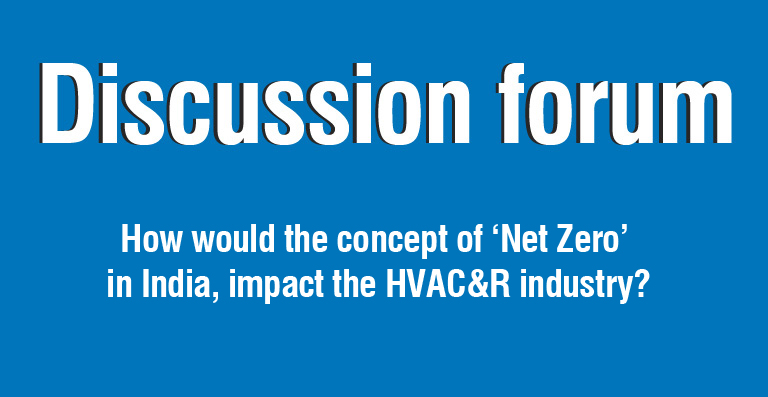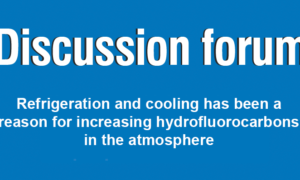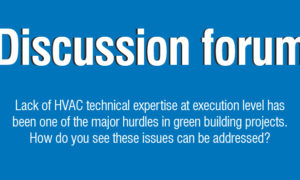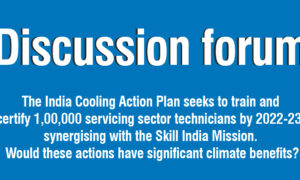Mihir Sanghavi, President, ISHRAE Mumbai Chapter

ISHRAE is already dedicatedly working towards multiple projects catering to this concept, and is firm on promoting the idea of Net Zero. Considerably, the present MEP services constitutes to 70 – 80 per cent of total energy consumption and any engineer, is accountable to make utmost use from the only available resources.
Unless, we as a manufacturer or producer don’t adapt and incorporate them to our routine lifestyle, we can’t expect any normal person to sustain into the same. We are living in a world, where, people are making wasteful use of water, for cleaning, gardening and other unwanted activities, and are away from the very fact that, more we waste our resources, the less we are able to preserve it for the future. Moreover, I feel that the industry is actively shifting towards the net positive concept, by going green, and becoming self-sustainable, by generating power from the available alternate resources like tri-generation, windmills, and are not entire reliant on the power grid.
Ayush Jha, CEO, Clairco

Increasingly, if we look at the energy consumption of buildings, especially, the commercial, it is done by the HVAC&R, which is established already. Almost 80 per cent of the energy consumption is done by the industry itself, at large. Having said that, it is highly imperative in today’s time that our HVAC systems are highly efficient and reliable. If we look at the energy consumption and the energy generation, especially in India, it is dependent on coal based energy generation. Because of those energy generation, the coal based plants generate massive pollution, and that is why, all these new technologies and new ideas have been brought into the grasp of ‘Net Zero’. It’s important for every HVAC manufacturers, OEMs and research companies to shift their focus on producing or generating high intensity energy efficient product and systems. IoT and other newer and finest technologies have been serving for the HVAC industry and are making them better every day, several start-up too are progressively providing their best of services, by upgrading the technologies in the HVAC&R to cater more energy efficient services in any building. Currently, the most commonly used technology being used by the industry is, the BMS technology, which don’t monitor the temperature in any building or does not control the entire buildings’ AHU, and many others, based on the data which is completely done based on the demands of any facility manager. When its data driven, it makes it way more energy efficient, and, today, the artificial intelligence is far equipped to serve better services in these areas. So, the entire transition altogether can be more efficient and energy saving, further leading us towards the ‘Net Zero’. Unless and until it’s in the HVAC, we can’t reduce the energy consumption, and the energy generation from the non-coal based plants, or non-renewable plants won’t suffice. Because, solar or any other plant that could generate energy has their own constrains, and they are making efforts to bring in photovoltaic energy sources that are efficient. However, it will require its lateral time to ensure the HVAC&R is able to adapt the same and cut down on its energy consumption.
Amod Dikshit, President, ASHRAE Mumbai Chapter

I think, the HVAC&R industry, is already a part of the Net Zero concept. Considerably, almost 50 per cent of the total power, is consumed by the HVAC industry. Not just the power, but even water consumption is largely done by this industry.
So, precisely, being the large consumer of power and water, we are highly responsible to make possible less use of the available resources of power and water. As, availability of essential sources like water and power, in the near future, stays a huge concern, as the resources on the earth will be remorse. We are definitely aware of the fact that there is a scarcity of water and power, when it comes to using them for supplementary means. With the help of trigeneration, we are able to generate power, water along with multiple sewage shipment plants, extracted from the water that we consume on a daily basis, by recycling it for further use of the HVAC&R industry.
Atlas Copco India, Cornad Latham, General Manager, Compressor Techniques

Recently, we have installed solar panels and rooftop solars to our Chakan plant in Pune, which produces almost 85 per cent of our total energy consumption. Today, in manufacturing, around 85 per cent of the total energy that’s being utilised for testing machines and other testing procedures are generated through the solar panels. During the weekends, we disburse the energy produced to the local surroundings and to the nearby industries and other deliverables. The best thing we can do to reduce the energy consumption of our compressors, is to further let reduce the energy consumption of our customers. We also have energy recovery solutions, so whatever energy is being produced and utilised by the compressors, is converted into the heat energy, in order to reuse the produced energy into varied applications and plants that may include provisioning water for the boilers and for the culinary activities in the pantry.
Kulwant Singh, Owner, Kleanwave Solutions

There are several initiatives taken by Government of India and various autonomous bodies to reduce carbon foot print and use of environment friendly technologies to develop a project/building. Due to the competition of making a project – an iconic project, the ‘Net Zero’ concept is adopted widely. Due to this concept, not only the HVAC industry but the construction sector, architects and developers’ segments are attracted towards adoptions of green technologies and renewable resources of energy which is a dawn of the new future as to make building Net Zero. More research have been conducted to develop products with best in class efficiency and runs on renewable sources of energy.
Cookie Consent
We use cookies to personalize your experience. By continuing to visit this website you agree to our Terms & Conditions, Privacy Policy and Cookie Policy.















